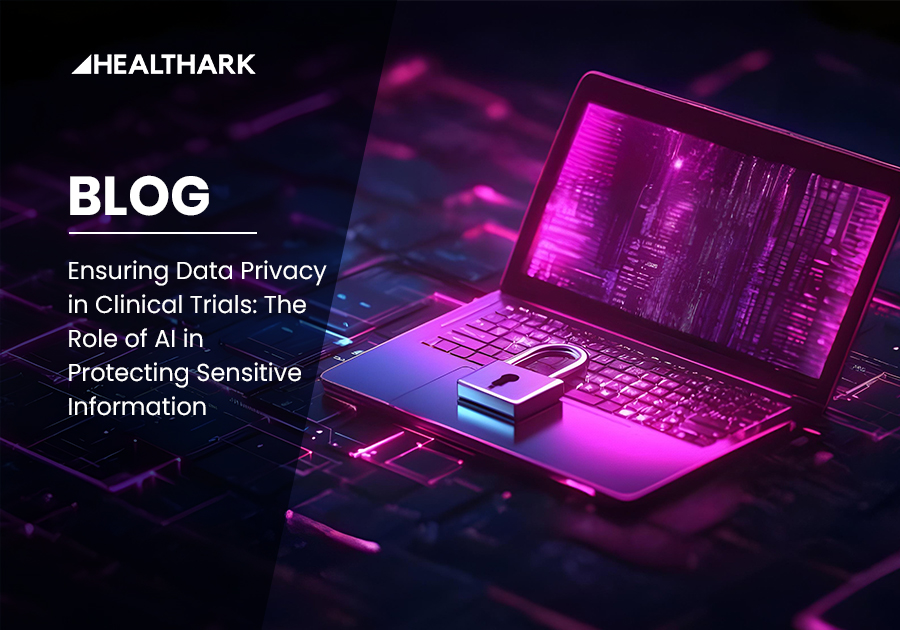Clinical trials are essential for advancing medical science and discovering new treatments, but they involve the collection and analysis of vast amounts of sensitive patient data. This data is invaluable to researchers, but it also presents significant risks, particularly when it comes to data privacy and security. Ensuring that this data remains confidential and secure is a priority for healthcare organizations, researchers, and regulatory bodies alike. As the volume and complexity of clinical data continue to increase, so too does the potential for security breaches.
In response to these growing challenges, Artificial Intelligence (AI) has emerged as a critical tool in safeguarding patient privacy in clinical trials. AI’s ability to detect threats, automate data management tasks, and ensure compliance with privacy regulations is transforming how sensitive medical data is handled. This blog explores the role of AI in ensuring data privacy in clinical trials and highlights the innovative solutions driving these changes.
The Growing Concern: Data Breaches in Healthcare
- 2023 Statistics: The healthcare sector experienced 725 data breaches, exposing over 133 million records. The HIPAA Journal
- 2024 Surge: In 2024, breaches affected approximately 276.8 million individuals, marking a significant increase. The HIPAA Journal
- 2025 Trends: By 2025, the average breach size rose to 71,276 records per incident. The HIPAA Journal
AI's Role in Enhancing Data Privacy
- Anonymization and De-identification
AI algorithms can anonymize patient data, ensuring compliance with regulations like GDPR and HIPAA, while maintaining data utility for research. This process involves removing or modifying personal information to prevent identification of data subjects.
- Predictive Risk Assessment
AI models can identify potential security threats by analysing patterns and anomalies in data access, enabling proactive measures. For instance, machine learning algorithms can detect unusual access patterns that may indicate a breach, allowing for timely intervention.
- Secure Data Sharing
Federated learning allows AI models to train on decentralized data sources without transferring sensitive information, preserving privacy. This approach enables collaborative model training across institutions while keeping data localized and secure.

Market Trends and Future Outlook
- AI Adoption in Clinical Trials: As of late 2024, only 11% of companies had fully implemented AI/ML in clinical trials, with larger organizations leading the adoption.
- Investment in AI Solutions: Companies reported an average investment of $1.1 million in AI/ML solutions, with higher investments in data quality and cleaning.
- Market Growth: The global AI in clinical trials market was valued at $1.20 billion in 2023 and is projected to reach $2.74 billion by 2029, growing at a CAGR of 12.4%.
Regulatory Landscape and Compliance
- EU AI Act: Effective by August 2026, this legislation sets standards for AI transparency and accountability, impacting clinical trial operations in Europe.
- Data Privacy Frameworks: Adherence to GDPR, HIPAA, and other regulations is crucial for maintaining patient trust and legal compliance.
Conclusion
The integration of AI in clinical trials is not just enhancing the efficiency and accuracy of research but also playing a pivotal role in protecting sensitive patient data. As we’ve seen, AI is helping to anonymize and de-identify data, predict and prevent security breaches, and allow for secure data sharing across institutions. These innovations are critical in an age where data breaches are increasingly common and the stakes for protecting patient privacy are higher than ever.
Looking ahead, the adoption of AI in clinical trials will likely increase, driven by growing investment and continued advancements in AI technology. As regulatory frameworks evolve to address these new challenges, clinical trials will become more secure, ensuring that patient privacy is maintained while advancing medical research.
In the years to come, AI will not only be a tool for enhancing data privacy but also a cornerstone in shaping the future of clinical trials. The next generation of research will benefit from AI-driven solutions that balance cutting-edge advancements with robust patient privacy protections.
Insights That Drive Impact
Healthcare is evolving faster than ever — and those who adapt are the ones who will lead the change.
Stay ahead of the curve with our in-depth insights, expert perspectives, and a strategic lens on what’s next for the industry.




